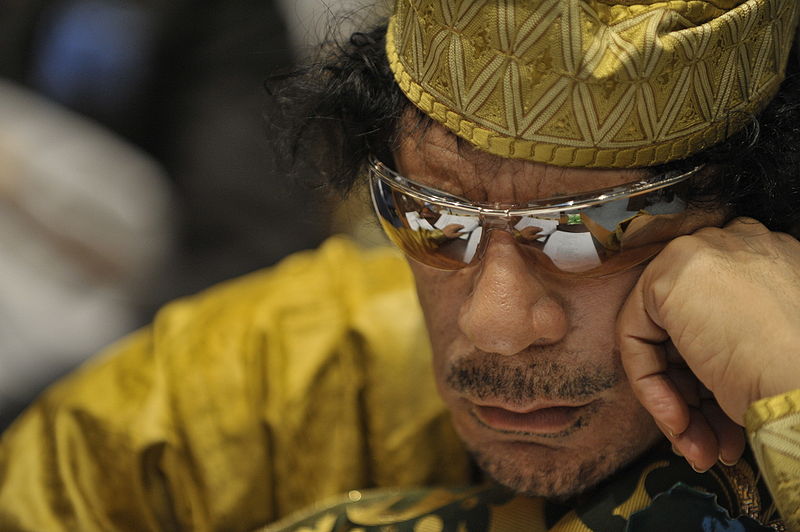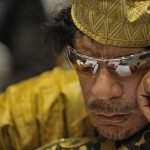After seizing power in 1969, he abolished the Libyan Constitution of 1951 and civil liberties enshrined in it. He imposed laws based on the political ideology he had formulated, called the Third International Theory and published in The Green Book. Rising oil prices and extraction in Libya led to increasing revenues. By exporting as much oil per capita as Saudi Arabia, Libya achieved the highest living standards in Africa. However, at the same time similarly oil-rich Gulf countries improved their living standards much further, and this fact was visible to ordinary Libyans. Early during his regime, Gaddafi and his relatives took over much of the economy. Gaddafi started several wars and acquired chemical weapons. The United Nations called Libya under Gaddafi a pariah state. In the 1980s, countries around the world imposed sanctions against Gaddafi. Six days after the capture of Iraqi dictator Saddam Hussein in 2006 by United States troops, Gaddafi renounced Tripoli's weapons of mass destruction (WMD) programs and welcomed international inspections to verify that he would follow through on the commitment. A leading advocate for a United States of Africa, he served as Chairperson of the African Union (AU) from 2 February 2009 to 31 January 2010.
Muammar al-Gaddafi was raised in a bedouin tent in the desert near Sirte (Sidra). According to many biographies, his family belongs to a small tribe of Arabs, the Qadhadhfa. They are mostly herders that live in the Hun Oasis. According to Gaddafi, his paternal grandfather, Abdessalam Bouminyar, fought against the Italian occupation of Libya and died as the "first martyr in Khoms, in the first battle of 1911". Gaddafi attended a Muslim elementary school far from home in Sabha, during which time he was profoundly influenced by major events in the Arab world. He was passionate about the success of the Palestinians and was deeply disappointed by their defeat by Israeli forces in 1948. He admired Egyptian President Gamal Abdel Nasser and looked to him as a hero during his rise to power in 1952. In 1956 Gaddafi took part in anti-Israeli protests during the Suez Crisis. In Sabha he was briefly a member of Scouting. He finished his secondary school studies under a private tutor in Misrata, concentrating on the study of history.
Gaddafi entered the Libyan military academy at Benghazi in 1961, and graduated in 1966. Both towards the end of his course and after graduation, Gaddafi pursued further studies in Europe. False rumours have been propagated with regards to this part of his life, for example, that he attended the United Kingdom's Royal Military Academy Sandhurst. He did in fact receive four months' further military training in the United Kingdom, and spent some time in London. After this, as a commissioned officer he joined the Signal Corps. Although often referred to as "Colonel Gaddafi", he was in fact only a Lieutenant when he seized power in 1969. He was, nonetheless, a holder of the honorary rank of Major General, conferred upon him in 1976 by the Arab Socialist Union's National Congress. Gaddafi accepted the honorary rank, but stated that he would continue to be known as "Colonel" and to wear the rank insignia of a Colonel when in uniform.
In Libya, as in a number of other Arab countries, admission to a military academy and a career as an army officer only became available to members of the lower economic strata after independence. A military career offered an opportunity for higher education, for upward economic and social mobility, and was for many the only available means of political action. For Gaddafi and many of his fellow officers, who were inspired by Nasser's brand of Arab nationalism, a military career was a revolutionary vocation.
As a cadet, Gaddafi associated with the Free Officers Movement. Most of his future colleagues on the Revolutionary Command Council (RCC) were fellow members of his graduating class at the military academy. The frustration and shame felt by Libyan officers by Israel's massive defeat of the Arab armies on three fronts in 1967 fuelled their determination to contribute to Arab unity by overthrowing the Libyan monarchy. An early conspirator, Gaddafi first started planning the overthrow of the monarchy while a cadet.
On 1 September 1969 a small group of junior military officers led by Gaddafi staged a bloodless coup d'état against King Idris of Libya while the king was in Turkey for medical treatment. Idris's nephew, Crown Prince Sayyid Hasan ar-Rida al-Mahdi as-Sanussi, was formally deposed by the revolutionary army officers and put under house arrest; they abolished the monarchy and proclaimed the Libyan Arab Republic.
On gaining power he immediately ordered the shutdown of American and British military bases, including Wheelus Air Base. He told Western officials that he would expel their companies from Libya's oil fields unless they shared more revenue. In his warning, he alluded to consultation with Nasser. The oil companies complied with the demand, increasing Libya's share from 50 to 79 percent. In December 1969, Egyptian intelligence thwarted a planned coup against Gaddafi from high-ranking members of his leadership. Many of the dissenters had grown uneasy with his growing relationship to Egypt. In response to the failed coup, Gaddafi criminalized all political dissent and shared power only with his family and closest associates.[citation needed] Gaddafi committed ethnic cleansing, expelling Italian settlers in Libya in 1970. Despising the Christian calendar, he replaced it as the country's official with an Islamic calendar. He renamed the months of the calendar. August, named for Augustus Caesar, was renamed Hannibal, and July, after Julius Caesar, was renamed Nasser, for Gamal Abdel Nasser. From 1971 to 1977, Gaddafi approved the Arab Socialist Union, modeled on Egypt's Arab Socialist Union (Egypt), to function as a political party in Libya. Gaddafi increasingly devoted himself to "contemplative exile" over the next months, caught up in apocalyptic visions of revolutionary pan-Arabism and Islam locked in a mortal struggle with what he termed the encircling, demonic forces of reaction, imperialism, and Zionism. As a result, routine administrative tasks fell to Major Jallud who became prime minister in place of Gaddafi in 1972. Two years later Jallud assumed Gaddafi's remaining administrative and protocol duties to allow Gaddafi to devote his time to revolutionary theorizing. Gaddafi remained the commander-in-chief of the armed forces and the effective head of state. The foreign press speculated about an eclipse of his authority within the RCC, but Gaddafi soon dispelled such theories by imposing measures to restructure Libyan society.
Muammar al-Gaddafi was raised in a bedouin tent in the desert near Sirte (Sidra). According to many biographies, his family belongs to a small tribe of Arabs, the Qadhadhfa. They are mostly herders that live in the Hun Oasis. According to Gaddafi, his paternal grandfather, Abdessalam Bouminyar, fought against the Italian occupation of Libya and died as the "first martyr in Khoms, in the first battle of 1911". Gaddafi attended a Muslim elementary school far from home in Sabha, during which time he was profoundly influenced by major events in the Arab world. He was passionate about the success of the Palestinians and was deeply disappointed by their defeat by Israeli forces in 1948. He admired Egyptian President Gamal Abdel Nasser and looked to him as a hero during his rise to power in 1952. In 1956 Gaddafi took part in anti-Israeli protests during the Suez Crisis. In Sabha he was briefly a member of Scouting. He finished his secondary school studies under a private tutor in Misrata, concentrating on the study of history.
Gaddafi entered the Libyan military academy at Benghazi in 1961, and graduated in 1966. Both towards the end of his course and after graduation, Gaddafi pursued further studies in Europe. False rumours have been propagated with regards to this part of his life, for example, that he attended the United Kingdom's Royal Military Academy Sandhurst. He did in fact receive four months' further military training in the United Kingdom, and spent some time in London. After this, as a commissioned officer he joined the Signal Corps. Although often referred to as "Colonel Gaddafi", he was in fact only a Lieutenant when he seized power in 1969. He was, nonetheless, a holder of the honorary rank of Major General, conferred upon him in 1976 by the Arab Socialist Union's National Congress. Gaddafi accepted the honorary rank, but stated that he would continue to be known as "Colonel" and to wear the rank insignia of a Colonel when in uniform.
 Muammar Gaddafi dead after |  Muammar Gaddafi Dead Photos: |  Muammar Gaddafi dead, it is |  Muammar Gaddafi was killed |  Moammar Gadhafi dead was |
 Dead Muammar Gaddafi |  Muammar Gaddafi Killed: Dead |  Muammar Gaddafi Dead Libya |  Colonel Gadhafi\x26#39;s death was |  Breaking News: Muammar Gaddafi |
On 1 September 1969 a small group of junior military officers led by Gaddafi staged a bloodless coup d'état against King Idris of Libya while the king was in Turkey for medical treatment. Idris's nephew, Crown Prince Sayyid Hasan ar-Rida al-Mahdi as-Sanussi, was formally deposed by the revolutionary army officers and put under house arrest; they abolished the monarchy and proclaimed the Libyan Arab Republic.
 Muammar Gaddafi Dead Photos: |  Muammar Gaddafi Killed: Dead |  Muammar Gaddafi Dead: |  Muammar Gaddafi Dead In Libya |  Muammar Gaddafi is Dead: |
 Muammar al Gaddafi |  Muammar Gaddafi, dead or |  Muammar Gaddafi Dead |  Photo: Muammar Gaddafi dead on |  Muammar Gaddafi died because |
No comments:
Post a Comment